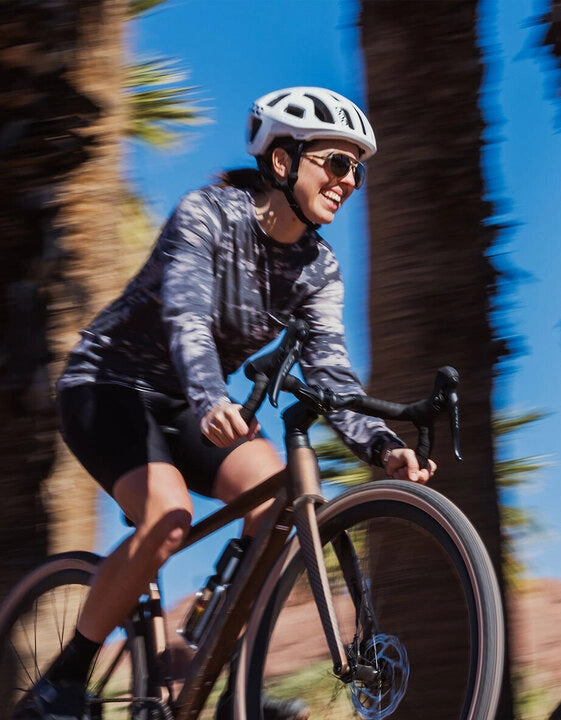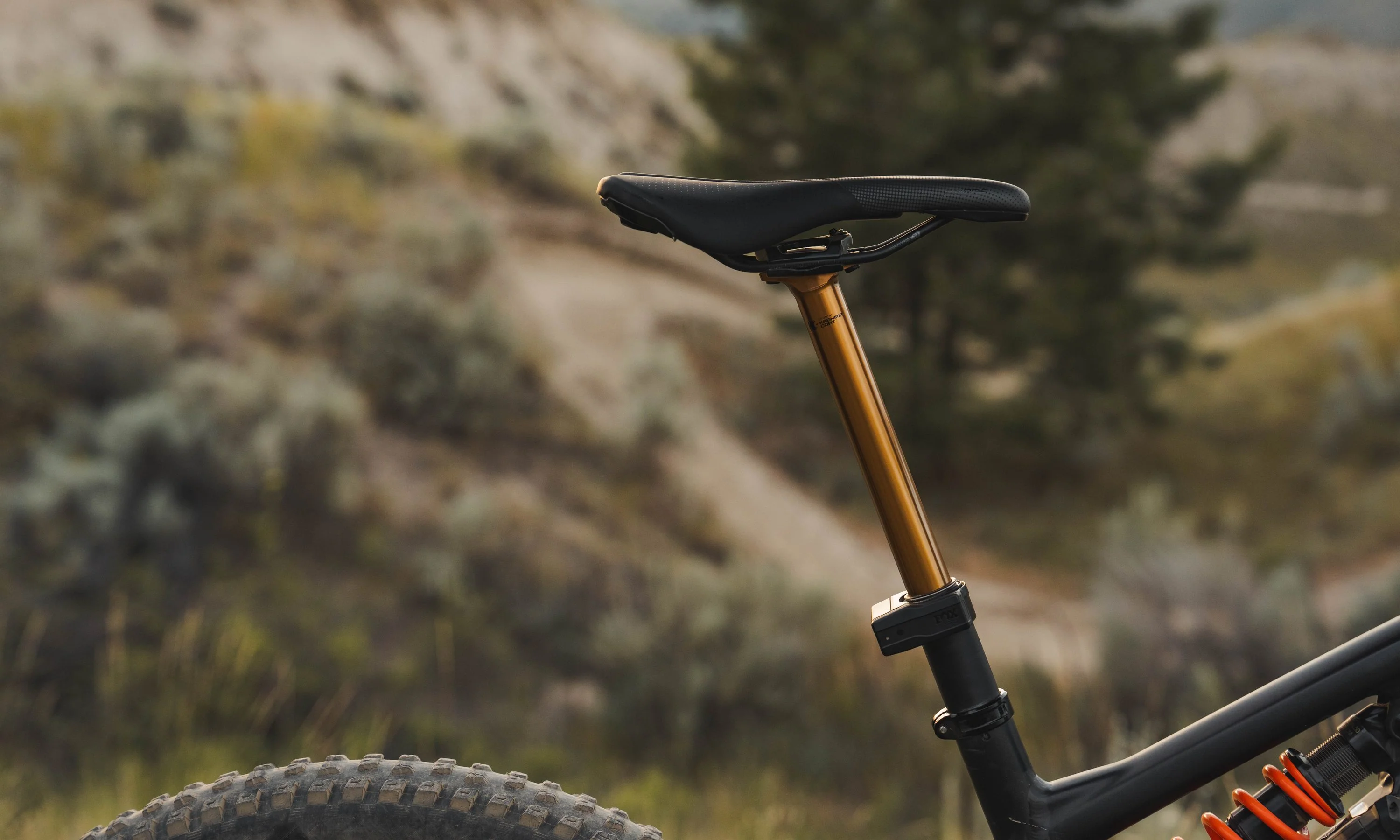When the original Yeti SB6 came out in 2014, I was still calling it an "all-mountain" bike. By its last production year in 2019, I had switched to calling it an "enduro" bike. What changed?
Within mountain biking, there's an absurd number of bike categories. You have XC bikes, downcountry bikes, trail bikes, enduro bikes, downhill bikes, and fat bikes. Within these categories you have sub-categories too — hardtail and full-suspension, short-travel, mid-travel, and long-travel. The MTB spectrum is huge and there is no single archetypal mountain bike.
This got me thinking about a mountain bike category that I haven’t heard mentioned in a very long time — “All-Mountain.” (or "All Mountain") Do you remember this term?
It’s been several years since I’ve actually heard another rider say it. It has more or less disappeared from mountain bike media, marketing copy (I’m guilty of this), and bike reviews. So my question is: Are all-mountain bikes still a thing?
[button]Shop Mountain Bikes[/button]
What Is (or Was) All-Mountain?
 The image Canyon uses on it's all-mountain landing page. Photo: Canyon
The image Canyon uses on it's all-mountain landing page. Photo: Canyon
Let’s rewind about 15 years. As I remember it, the “all-mountain” bike category referred to mountain bikes that sat somewhere between the two extremes of the discipline: XC (cross-country) and DH (downhill).
XC bikes were for those who wanted to climb fast and go long distances while DH bikes were for those who cared about descending quickly and shredding. But what if you were a rider who wanted to do it all? Well, that’s where ALL-mountain bikes came in — they could ride up AND down mountains! The all-mountain bike was the tool the original quiver-killer, an all-encompassing, do-everything machine.
Let’s take a look at how three big mountain bike manufacturers define all-mountain…
- Trek: “All-mountain bikes are the most capable full-suspension bikes on the trail. They're meant for technical terrain, riding hard, and for discerning riders who know what they want.” (lol kinda vague, Trek.)
- Canyon: “Are you the kind of do-it-all rider who mixes it up with those euphoric uphill ascents, sweet rough trails, and relaxed cross-country riding? Then All Mountain Bikes are ideal for your versatile style … Simply put, it’s the all-rounder among mountain bikes: the Jack or Jill-of-all-trades."
- Norco: “As at home descending as they are on the climbs, All-Mountain riders tackle everything mountain biking has to offer in the search for speed.”
Why Did We Stop Saying “All-Mountain”?
 My Canfield Nimble 9. It was originally called an "all-mountain hardtail." Now, Canfield refers to the latest version as "The original hardcore hardtail."
My Canfield Nimble 9. It was originally called an "all-mountain hardtail." Now, Canfield refers to the latest version as "The original hardcore hardtail."
If I Google “all-mountain bike,” only a few come up that still have a dedicated category page on their website for all-mountain bikes. This will probably come as no surprise, but it’s the three brands I quoted above: Trek, Canyon, and Norco.
If we poke around the websites for other big bike brands like Specialized, Cannondale, Orbea, and Giant, as well as “core” mountain bike brands like Yeti, Santa Cruz, Ibis, Transition, and Evil, we see that they not only don’t have dedicated all-mountain category pages, but they also don’t use “all-mountain” in any of their marketing copy anymore. What happened?
The Rise of Trail Bikes
 Trek's Fuel EX trail bike has been its biggest seller for years. It can go up and down mountains too, just like an all-mountain bike. Photo: Trek
Trek's Fuel EX trail bike has been its biggest seller for years. It can go up and down mountains too, just like an all-mountain bike. Photo: Trek
Here’s how I remember it (and I’d love anyone with a differing memory to correct me!). Sometime around the early-2010s, I started hearing the term “trail bike” more and more. In a lot of ways, a “trail bike” is the same as an “all-mountain” bike. It’s just a do-it-all machine.
But maybe there’s a slight hint that maybe “trail” sits a bit closer to the XC end of the spectrum. To get specific, trail bikes are generally on the lighter end, so they climb better. They have more modest travel so they're more efficient pedalers and they feel more agile.
Let’s take a look at an archetypal modern trail bike: the Specialized Stumpjumper. In 2009, Specialized marketed the 120mm Stumpjumper FSR 29 as “the anything and everything mountain bike” and it was described as “trail-tuned.” Then, in 2010, we saw the words “trail bike” actually appear in Specialized’s marketing copy for the Stumpjumper. It says: “The Stumpjumper FSR is absolutely the best breed of XC Trail bike — it's the anything and everything.”
It wasn’t just Specialized. It was the whole industry embracing "trail." Let’s look at the three brands currently still using all-mountain, and see how they currently define their trail bikes…
- Trek: “Trail bikes are your do-more ride. They're versatile, light, and exceedingly capable, climbing as well as they descend … No other bikes offer this level of no-compromise performance, any-situation versatility."
- Canyon: “Whether you're riding a flowy singletrack, cruising through the countryside on a cross-country ride, or challenging yourself in a bike park, a trail bike provides a ton of fun in any terrain.”
- Norco: “Where endurance mountain biking and adrenaline meet, Trail riders tackle high-speed, technical singletrack, and all-day adventure.”
The Rise of Enduro Bikes
 The Norco Range is an enduro bike. Yes it can ride up and down mountains too, but it's an enduro bike. Photo: Norco.
The Norco Range is an enduro bike. Yes it can ride up and down mountains too, but it's an enduro bike. Photo: Norco.
Not long after “trail bike” entered my mountain biker lexicon, another new trend hit the scene in the early-2010s: Enduro. Enduro racing aimed to capture the spirit of how many (non-XC) mountain bikers actually ride their bikes. Results were determined by adding up timed downhill stages, while uphill “transfers” were untimed. The fastest descender wins. It was downhill racing without lifts or shuttles.
To capitalize on this increasingly popular and competitive form of racing, manufacturers of course had to make dedicated “enduro bikes.” Compared to trail bikes, these bikes had more suspension travel, more progressive geometry, and burlier construction. They were essentially mini-downhill bikes that could be pedaled uphill.
Let’s look again at how our three reference brands define enduro…
- Trek: “Enduro pushes the limits of mountain biking, combining the technical capability of downhill with the endurance of a trail ride.”
- Canyon: “Fast descents on hard trails, easy uphill pedaling, and occasional visits to the bike park - an Enduro bike offers endless fun … Unlike a Trail Bike, the strength of an Enduro Bike lies in riding rougher downhill trails. Trail Bikes have playful handling and are faster uphill due to their lighter weight.”
- Norco: “Tough, multi-stage events over rough terrain take a lot out of you. Enduro mountain bikes need to descend fast and pedal efficiently to save energy.”
The Death of “All-Mountain” Bikes
 Can all-mountain really be "dead" if the Downieville Classic is still going? It's the All-Mountain World Championship! Photo: Sierra Buttes Trail Stewardship
Can all-mountain really be "dead" if the Downieville Classic is still going? It's the All-Mountain World Championship! Photo: Sierra Buttes Trail Stewardship
So we have three mountain bike categories: Trail, all-mountain, and enduro. All three sit between XC and DH. To me, trail and enduro sit on either side of all-mountain, and they've essentially squeezed it out. Is that really why we don't say it anymore though? I mean, we added a whole new "downcountry" category in between XC and Trail. Surely, we'd have no qualms with leaving all-mountain slotted between trail and enduro. So why haven't we?
Here’s my theory: Riders just like their jargon to sound cool. Let’s pretend you’re a hardcore mountain biker with multiple bikes talking to your riding buddies who are also hardcore mountain bikers with multiple bikes. Imagine telling them: “I did a sick all-mountain ride” vs. "I did a sick trail ride." Which sounds cooler? Or "I race all-mountain" vs. "I race enduro." I can’t really explain it, but for some reason, "all-mountain" just sounds silly. Does it sound sillier than "downcountry" does? Maybe...
Here’s another theory: SEO (search engine optimization) killed "all-mountain." I realized this when searching for brands who were still using “all-mountain” on their websites. If you search “all-mountain bikes,” many of the results are just results for pages contain the words “all” and “mountain bikes.” All-mountain is a good, descriptive name that simultaneously lacks any sort of specificity. I think it's the same reason we say "gravel bikes" instead of "all-road bikes." Search "all-mountain bikes" vs. “trail mountain bikes” vs. “enduro mountain bikes.” Which is going to pull the most well-curated results?
Anyway, those are my theories. In reality, all-mountain bikes do still exist. We just don't call them that anymore. The Downieville Classic is still the "All Mountain World Championships." All-mountain riding is still a thing that people do. We just don't call it that anymore. There's likely already a generation of riders who have never even heard of "all-mountain bikes." Categories and names evolve, and sometimes it's silly and pointless. Who knows what bike categories we'll have in another 10-15 years?
[button]Shop Mountain Bikes[/button]

























